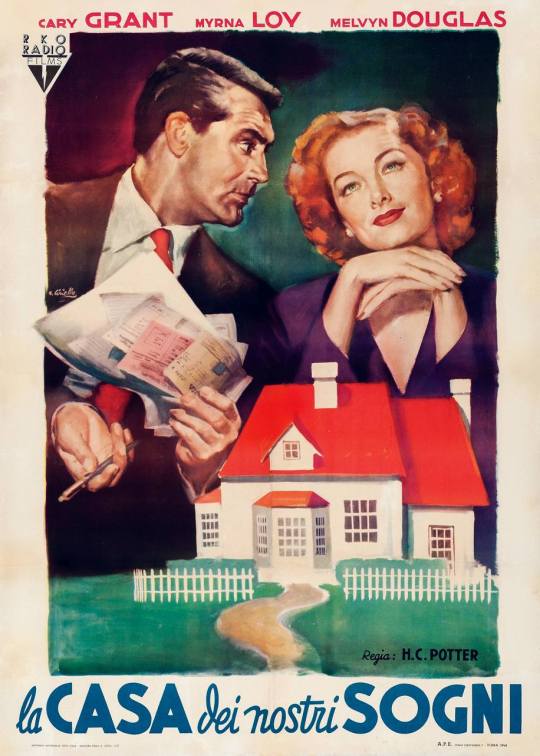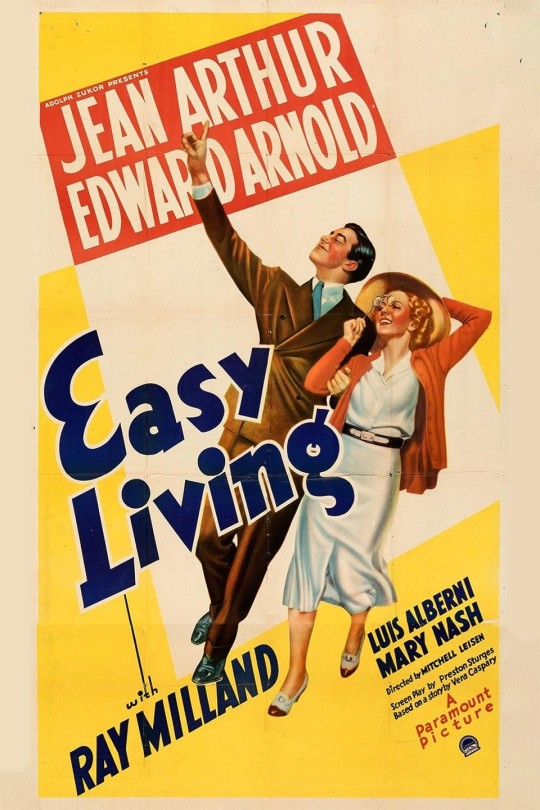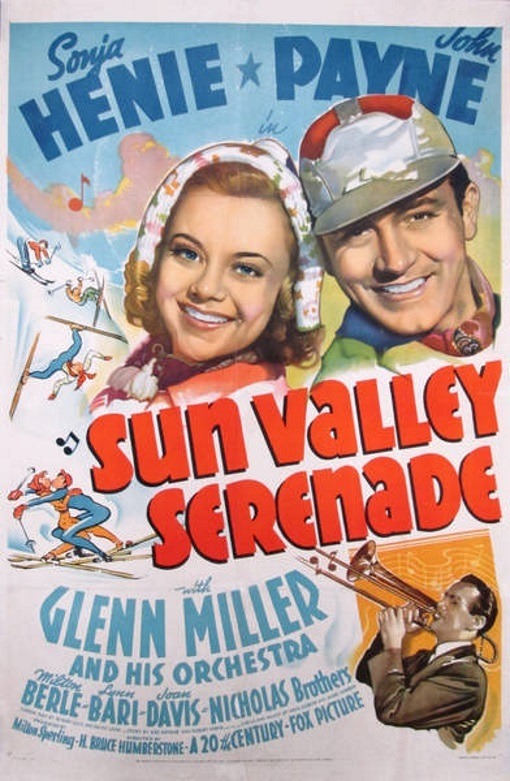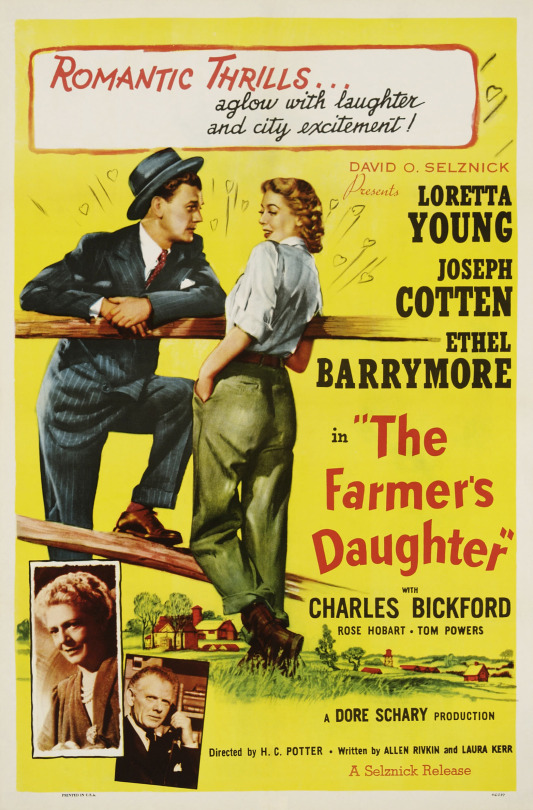#H.C. Potter
Explore tagged Tumblr posts
Text










You Gotta Stay Happy (1948) H.C. Potter
June 15th 2024
#you gotta stay happy#1948#h.c. potter#james stewart#joan fontaine#eddie albert#marcy mcguire#arthur walsh#willard parker#percy kilbride#porter hall#roland young#william bakewell
2 notes
·
View notes
Text

#movies#polls#mr blandings builds his dream house#cary grant#myrna loy#h.c. potter#ended#result: unheard of
3 notes
·
View notes
Text

2 notes
·
View notes
Photo
Happy National Pet Day!


Myrna and her black poodle “Mike.” In the lower image she is with H.C. Potter, director of Mr. Blandings Builds His Dreamhouse.
#It's National Pet Day#myrna and her dog#Myrna Loy#old hollywood#mr blandings builds his dream house#H.C. Potter#stars and their pets
125 notes
·
View notes
Text

Isn't It Romantic (2019, Todd Strauss-Schulson)
04/11/2023
Isn't It Romantic is a 2019 film directed by Todd Strauss-Schulson and written by Erin Cardillo, Dana Fox and Katie Silverman. The film stars Rebel Wilson, Liam Hemsworth, Adam DeVine and Priyanka Chopra.
The film was released in the United States on February 13, 2019 by Warner Bros. Pictures and internationally outside the United States and Canada by Netflix on its platform on February 28, 2019.
#isn't it romantic#Todd Strauss-Schulson#Erin Cardillo#rebel wilson#liam hemsworth#adam devine#priyanka chopra#warner bros#netflix#Metacinema#Meta-cinema#suspension of disbelief#metafiction#Road to Singapore#Victor Schertzinger#hellzapoppin#H.C. Potter#8 1/2#federico fellini#the passion of anna#ingmar bergman#french new wave#contempt#jean luc godard#day for night#françois truffaut#f for fake#orson welles#Through the Olive Trees#abbas kiarostami
1 note
·
View note
Text

William Bendix and James Cagney in THE TIME OF YOUR LIFE (1948). Director H.C. Potter
25 notes
·
View notes
Text
Please send requests.
I have been a bit busy with uni, but I have major writers block.
Please send me requests. I am happy to write what you want.
Preferably:
Marvel x fem reader. Any character, I dont mind.
Happy to write smut but it won't be AWESOME.
I will happily take moodboard suggestions, drabbles or H.C.
Not into writing a series atm. When I figure out how to add links, I will take series reqs.
Happy to write for Top gun, Harry Potter, Outerbanks, MCU, Chris Evans,Sebastian Stan and Henry Cavill characters aswell.
NOT GORY OR VIOLENT REQUESTS. I DO NOT WRITE THREESOMES. ONLY X FEM READER UNLESS STATED OTHERWISE.
#marvel fanfiction#sebastian stan#bucky barnes imagine#bucky barnes x female reader#sebastian stan fandom#marvel cinematic universe#bucky imagine#sebastian stan characters#top gun fanfiction#top gun maverick#top gun movie#tgm#jake hangman fic#jake hangman smut#jake hangman x reader#jake hangman seresin#hangman x reader#hangman imagine#jake hangman seresin x reader#henry cavill x yn#steve rogers x yn#bucky barnes x reader smut#christopher robert evans#bucky x reader#bucky barnes x reader#bucky x female reader#chris evans x reader#chris evans fanfiction#jake seresin x reader#bradley rooster bradshaw
11 notes
·
View notes
Text

Hellzapoppin' (H.C. Potter, 1941)
!!
2 notes
·
View notes
Text

1/11/24
MR. BLANDINGS BUILDS HIS DREAM HOUSE, directed by H.C. Potter, 1948.
2 notes
·
View notes
Text
Three Cary Grant movies in a row!
Script below the break
Hello and welcome back to The Rewatch Rewind! My name is Jane, and this is the podcast where I count down my top 40 most rewatched movies. Today I will be discussing number 28 on my list: RKO’s 1948 comedy Mr. Blandings Builds His Dream House, directed by H.C. Potter, written by Norman Panama and Melvin Frank, based on the novel by Eric Hodgins, and starring Cary Grant, Myrna Loy, and Melvyn Douglas.
Yes, I’m talking about yet another Cary Grant movie – I warned you there would be a lot of them. In this one, he plays Jim Blandings, an advertising executive who lives in a Manhattan apartment with his wife Muriel (Myrna Loy) and their two children. Tired of feeling crowded, and taken in by an advertisement, they decide to purchase an old house on a large property in Connecticut. They initially resist the idea that the house must be torn down, but ultimately get excited about being able to build one to their own specifications. However, this is not nearly as simple, or as affordable, as they anticipate.
The first time I watched this movie, it was late at night and I was very tired, so I remember almost falling asleep without really getting into it. But I enjoyed it a lot more the second time, and it’s grown on me over the years. I watched it for the first time in 2003, then twice in 2004, and then once each in 2006, 2008 through 2013, 2015, 2016, 2018 through 2021, and then twice in 2022. And while I could barely keep my eyes open the first time I watched it, now I find it difficult to tear them from the screen when the movie is on.
As I’ve said several times in previous episodes, Cary Grant was a brilliant comedic actor, and once again, he is very funny in this movie. Just watching his morning routine in the apartment at the beginning is hilarious. Jim Blandings is very sure of himself, even and especially when he shouldn’t be, and Cary plays that very convincingly and humorously. Myrna Loy is probably best known for playing Nora Charles in the comedy-mystery Thin Man movies, so it should come as no surprise that she is also very funny here. Muriel occasionally tries to rein in some of Jim’s recklessness, but also gets caught up in the dream of the house, and Loy portrays that flawlessly. Apparently critics thought these stars were too old for these roles (they were both in their mid-40s at the time), and that it would have made more sense to show a naïve young couple not knowing how to build a house, but personally I think it works better to show a middle aged couple who have every reason to believe they know what they’re doing find out that they have no clue. The movie also makes it clear that it’s only because Jim is older and more established in his career that he’s able to do this. At one point when he’s venting about how everything’s costing way more than they were anticipating, Jim points out that if he can barely afford it, there’s no way a young couple ever could. And looking at this movie from a modern lens is kind of surreal because like, imagine a single-income family of four being able to afford a house! To put things in perspective, Jim Blandings was making $15,000 a year in 1948, which is the equivalent of approximately $190,000 in 2023, and the final cost of his dream house was $38,000, or approximately $480,000 now. It certainly costs a lot more than he initially thinks it will, but it’s still doable for him – although he does nearly lose his job at one point – whereas it would not have been for a young couple just starting out. And again, Cary Grant and Myrna Loy are so delightful to watch that I cannot comprehend wanting to replace them.
The acting and the writing encourage the audience to laugh at both Jim and Muriel while still finding them sympathetic. There’s a rather beautiful poetic justice in the story of an advertising executive, who spends all day figuring out how to convince people to buy things they don’t need and can’t afford, getting convinced by an ad to build a house he doesn’t need and can’t afford. And yet, we still want him to succeed, and share his frustration when things go wrong. Muriel’s extremely specific demands for the house can be ridiculous, but we still want her to get the dream house she desires. Perhaps her greatest moment in the film is when she spends several minutes describing in detail the exact shade she wants each room painted: one should exactly match the color of fresh butter, one needs to be white – not a cold, antiseptic hospital white, but not to suggest any other color but white; another should be practically an apple red, somewhere between a healthy Winesap and an unripened Jonathan, etc. When she finally gets distracted and walks away, one of the painters says to the other, “You got all that?” and the other replies, “Red, green, blue, yellow, white.” It’s very funny, but also maybe a little bit sexist, in a “These silly women and their ridiculous obsession with detail” way, but at least the movie makes fun of Jim too. He’s constantly taking charge of things he doesn’t understand and making them worse – from illegally authorizing the old house to be torn down to inadvertently instructing builders to rip out their work. So rather than making fun of Jim and Muriel specifically, the movie is really making fun of the gender roles they feel obligated to fulfill, and the way society has made basic needs like shelter immensely complicated to obtain. And while some of that is rather painful to face, this movie manages to make the overall experience mostly enjoyable. It’s thought-provoking without becoming too upsetting.
While a lot of what I love about this movie comes from Grant and Loy, I also love Melvyn Douglas’s performance, and his character, Bill Cole, is probably my favorite. Bill narrates portions of the movie, and introduces himself to the audience as “Jim’s lawyer and quote best friend unquote.” He’s kind of the voice of doom regarding the dream house project, pointing out all the ways Jim gets taken advantage of along the way and repeatedly advising him to give up, but far from being a stick in the mud, he has an excellent sense of humor, and goes along for the ride only slightly reluctantly. There’s a trope that’s especially common in movies from this era of a married couple having a male “friend of the family” who is interested in the wife and kind of waiting for her to either leave her husband for him, or at least have an affair with him. The character of Hank Entwistle in Monkey Business is like this, and there’s a character in the movie I’m going to talk about next week like this. Bill Cole is almost like this, and Jim certainly sees him like this for a good chunk of the movie, but the way I see him, he’s not actually interested in Muriel that way, and is, in fact, if not canonically queer, certainly queer-coded. We do know that he dated Muriel in college. At one point when Jim asks Muriel why Bill’s always hanging around them instead of getting married, Muriel says it’s because he could never find another girl like her, but this doesn’t seem like it’s meant to be particularly serious. When Jim objects to the fact that Bill always takes his leave by shaking Jim’s hand and kissing Muriel on the cheek, Muriel dryly inquires if Jim would prefer it the other way around. There is also a running joke about Jim and Bill getting stuck in a closet, so modern audiences might interpret that to mean that they’re secretly gay, although I’m pretty sure the closet metaphor wasn’t commonly used in 1948. Bill doesn’t seem to really show any attraction toward either Jim or Muriel, so of course I’m inclined to headcanon him as aroace. We do find out that Muriel somehow ended up with both Bill’s and Jim’s fraternity pins – which the Blandings daughters find along with her old diary in the process of moving into the new house. When Jim then confronts Muriel about her having been in love with Bill, she laughs and responds with, “Of course I was in love with Bill! In those days I was in love with a new man every week!” She considers her time dating Bill to be relatively meaningless, and currently sees him as a good friend. Most of Jim’s bouts of jealousy in the movie seem to be misplaced frustration with the way things are going with the house and/or his job, rather than in response to any of Muriel or Bill’s behavior, which is part of the film’s effective commentary on how gender roles leave men feeling like they can’t express their emotions honestly.
Anyway, one evening, when Jim is working late because a slogan he’s been struggling to come up with for months is due the following morning, Bill stops by the new house to visit Muriel, and there’s a major rainstorm. A neighbor informs Muriel that her phone isn’t working and a nearby bridge is out, so her children can’t get home from school, but they’re staying with a different neighbor on the other side of the bridge. This also means that Bill can’t get home, so he’ll have to spend the night in the house alone with Muriel. When he half-jokingly gasps, “Think of my reputation!” Muriel responds with, “Don’t worry, Snow White, you’ll be just as pure and unsullied in the morning as you were the night before,” and he says, “That’s the story of my life.” Now, I feel like there are a couple different ways to interpret this. One way – the allo-heteronormative way – is that they would like to sleep together, but she’s happily married, and he respects that, so they resist. I’m not saying that’s an invalid interpretation, but something about the way they deliver those lines, and the way they interact in the rest of the movie, doesn’t quite feel like that to me. Another interpretation is that they don’t want to sleep together, and they just want to make sure they’re on the same page about that. Think about how much better it makes the scene if Bill is asexual, and his “Think of my reputation!” is his way of making a joke out of not feeling comfortable with the situation, and her response is reassuring him that she understands and doesn’t see him that way either, and his “That’s the story of my life” is him trying to pretend to be disappointed because an allonormative world tells him he should be, but he’s actually relieved. This could also be because Bill is gay, or straight or bi and just not attracted to Muriel, but even then, the point about defying social expectations still stands. Since long before I knew the terms “aromantic” or “asexual,” I have been drawn to stories about people who are expected to fall in love and/or sleep together and then don’t. It has always felt so encouraging to see adults maintaining close platonic relationships, even when society tells them they shouldn’t be platonic. So I love that Bill and Muriel are friends who can spend the night in the same house without becoming overwhelmed by passion or whatever seems to usually happen in situations like that.
Of course, in this particular case, due to production codes there was basically no chance that they would commit adultery anyway, and all of this is probably definitely me reading way too much into something that’s barely there. The following morning, when Jim makes it back home – after giving up on the slogan even though he knows he’ll be fired – and finds out that Bill spent the night, there’s a bunch of other stuff going on with the contractor telling them about more expenses they’ve incurred, but Jim is particularly upset about Bill being there. Then one of the workers shows up at the house and declares, “There’s a matter of twelve dollars and 36 cents” and Jim loses it, going off on a whole rant saying things like, “Why stop there? Just take everything I have!” until the worker clarifies, “No, I owe you $12.36.” Suddenly Jim’s anger melts away, and he also loses every trace of jealousy and suspicion. This certainly supports what I said earlier about Jim’s jealousy really being misplaced frustration, which I also think supports the idea that Bill is asexual, and that even if people didn’t use that term at that time, at least on some level both Jim and Muriel understand that Bill is not a threat to their marriage. Jim is only jealous because he feels like he should be, and it’s a convenient and socially acceptable outlet for his real feelings. The last shot of the movie is of the Blandings family enjoying their front yard, with Jim reading the book the movie is based on. He looks up and says to the audience, “Drop in and see us sometime” and then Bill moves into frame and adds, “Yeah, do that, won’t you?” implying that he has been accepted as practically part of the family, and that if he is aroace, he’s certainly not alone, and I absolutely love that.
I’ve mentioned before that part of why there are so many Cary Grant movies in my top 40 is because I have a multi-day marathon around his birthday every year, and Mr. Blandings Builds His Dream House is almost always part of that. I tend to watch this one on his actual birthday because the only specifically Cary Grant-related item of clothing I own is a long-sleeved t-shirt I got for Christmas in 2007 with a quote from this movie on it, which I will probably wear every January 18 for the rest of my life, even though I kind of have mixed feelings about the context of the quote in the movie. The slogan that Jim gives up on during that fateful stormy night is for a product called Wham, which is a brand of ham. He spends all night trying to come up with an acceptable slogan, but they’re all terrible. I would like to point out that he’s working on this with his female secretary, which means he has even less reason to be jealous of Muriel spending all night with Bill, but that’s not really important. I also feel the need to tell you about my favorite bad slogan he comes up with: “This little piggy went to market, as meek and as mild as a lamb. He smiled in his tracks when they slipped him the axe; he KNEW he’d turn out to be Wham!” The extremely concerned look on his secretary (played by Lurene Tuttle)’s face when she hears that is so perfect. But anyway, he finally gives up and goes home, and after all the drama of finding Bill there and owing more money but also getting a refund, the maid Gussie (played by Louise Beavers) is serving breakfast, and when the girls ask if there’s ham, she replies with, “Not just ham; Wham! If you ain’t eatin’ Wham, then you ain’t eatin’ ham!” And Jim does a double take and then exclaims, “Give Gussie a $10 raise!” and then we see a magazine ad featuring Gussie’s face and this slogan, and I have some questions. What exactly did he mean by a $10 raise? Ten dollars per hour? Per week? Per year? Also did he actually give her credit for coming up with the slogan, or did they just use her words and likeness without her really getting anything out of it, apart from this ambiguous raise? Part of me likes to think that she got hired by Jim’s advertising agency after this, but I feel like the more likely explanation is that a white man took credit for a black woman’s work. So again, I have some mixed feelings about my shirt that has a picture of a ham on it with the words “If you ain’t eatin’ Wham, then you ain’t eatin’ ham!” But despite its weirdness and its flaws, I mostly have positive feelings toward this movie. And I will never forget the joy I felt the one and only time someone who hadn’t watched this movie with me recognized the quote from that shirt, so shout out to my 12th grade history teacher.
Thank you for listening to me discuss yet another Cary Grant movie. I do apologize if you’re getting tired of hearing about him, but at least each of the four Cary Grant movies I’ve talked about so far has been from a different decade, so hopefully that has added enough variety to keep things interesting. Next up is another 1940s movie, although Cary Grant was not in it, so you’ll get a break from hearing about him, for now. In previous episodes I’ve ended with a single line from the next movie, but for this one I have to quote a three-line exchange between two people, because it’s my favorite part of the movie and I can’t help myself. “And then I heard a noise, and then I saw-” “What kind of a noise?” “…Like a sound.”
#mr blandings#mr blandings builds his dream house#cary grant#myrna loy#melvyn douglas#aroace headcanons#rewatch rewind
7 notes
·
View notes
Text
§ 3.589. Amor que mata (Curtis Bernhardt, 1947)
JUEVES, 28 DE NOVIEMBRE DE 2024

Un noir diferente. Angustioso, médico, psicológico. Música ruidosa y estridente, acorde a la historia que nos cuenta.
Un trio protagonista de escándalo: una Joan Crawford absolutamente imperial, dominando toda la escena, todo el desarrollo de la historia; el gran Van Heflin con su característico pelo rojo, y el magnífico actor que es Raymond Massey, que haciendo de perverso no tiene rival.
La enfermedad mental, la esquizofrenia, los tratamientos médicos, la evolución de la obsesión amorosa como desencadenante y, a la vez, catalizador de la enfermedad tiene su gracia, su aquel y su sentido. El tránsito de una mera obsesión a una auténtica enfermedad está muy bien subrayado en la historia, quizá algo amanerada, pero sincera. ¿Se puede enfermar de amor? Seguramente sí, como de cualquier otra obsesión humana.
Crawford fue candidata a los Oscar por su actuación, pero, no sé bien por qué, gano Loretta Young en "Un destino de mujer", dirigida por H.C. Potter, que no he visto. Pero tiene que ser un papel magnífico, porque esta cinta es extraordinaria y el papel de ella espléndido.
0 notes
Text

Parada de Malucos
EUA, 1941
H.C. Potter
7/10
Slapstick ao Melhor Nível
Confesso que não conhecia esta dupla de comediantes Ole Olsen and Chic Johnson, mas fiquei com vontade de conhecer melhor. Este filme, uma loucura absoluta, que pode bem ser elevado ao título de rei da slapstick comedy, é tudo menos banal. É certo que a comédia física está fora de moda, mas aqui há de tudo, para todos os gostos, e geralmente acontecendo em simultâneo. É um mix de espetáculo circense, com uma comédia musical dos irmãos Marx e um extravagante musical de Busby Berkeley, tudo ao mesmo tempo.
Destaque ainda para a atriz pouco reconhecida Martha Raye, uma das poucas mulheres comediantes da sua geração, que domina a comédia física com a ousadia de um Jerry Lewis.
Sem dúvida alguma, uma agradável surpresa.
Slapstick at the Best Level
I confess that I didn't know this comedian duo Ole Olsen and Chic Johnson, but I want to know more. This film, an absolute madness, which could very well be elevated to the title of king of slapstick comedy, is anything but banal. It's true that physical comedy is out of fashion, but there's something here, for all tastes, and usually happening simultaneously. It's a mix of a circus show, a Marx Brothers musical comedy and an extravagant Busby Berkeley musical, all at the same time.
Also noteworthy is the little-recognized actress Martha Raye, one of the few female comedians of her generation, who masters physical comedy with the boldness of a Jerry Lewis.
Without a doubt, a pleasant surprise.
0 notes
Text
7/14/2024 - Nuts, Off the Wall, and Morally Deplorable
Hello, folks! This post is the official maiden voyage for this media blog. My name is Alan, and I'm an English major that hails from the hellishly hot state of Oklahoma. Hopefully this page will introduce you to something novel, something familiar, or even encourage you to recommend a piece of media that happens to catch your fancy.
How Language Began: The Story of Humanity's Greatest Invention by Daniel L. Everett (featuring a sick-looking Chinese cover not on the copy I borrowed from the library)

How Language began is a compellingly-written, well-sourced case for the origin of human language as a cultural construct, and which provides convincing argumentation against the origin of language from innate human biology proposed by Noam Chomsky and the mainstream field of linguistics. While I have found this to be an enthralling read, I can occasionally feel myself bristle at the occasional appearances of atheistic rationalist smugness that seems to abide by an ethos a couple decades out of date, as well as the needlessly pitying portrayals of autistic people in discussing how they differ in neurotype. Would definitely recommend, though, for those with an interest in human cognition.
Hellzapoppin' (1941) - dir. H.C. Potter

Hellzapoppin' is nuts. Hellzapoppin' is off the wall. Have you seen Hellzapoppin'? While not the most faithful adaptation of the even more frenetic stage musical that graced Broadway for a brief four years, this movie still, in its own right, manages to kickstart a surrealist comedy movement that would echo throughout film in the decades to come. The best Mel Brooks picture that Mel Brooks never directed.
Peep Show (2003-2015) - cr. Sam Bain, Jesse Armstrong, and Andrew O'Connor

A quintessential part of the library of any post-grad squatter worth their salt, Peep Show is paradoxically one of those pieces of media that I am very shy about recommending and yet believe is essential viewing for everyone. Low-fi freaks, stoners, disillusioned office workers, and esoteric history enthusiasts alike will delight in the misadventures of these morally-deplorable, acerbically-written Englishmen.
This Is The Kit: NPR Music Tiny Desk Concert
youtube
A tight, mellow, in-person set from This Is The Kit, a folk band whose work hearkens back to the medieval British melodies accompanied by guitar that lived on in centuries past. As this a Tiny Desk Concert, there is, of course, a superb snippet of music journalism from NPR correspondent Bob Boilen in the description box, too.
0 notes
Text
Letterboxd List: Classic Films on YouTube (pt. 1)
Watching classic films these days can be tricky. There’s TCM if you have cable and Criterion if you stream, but where do those of us without access to either of those channels go for old favorites and new-to-us classics? The same place we get the rest of our entertainment these days: YouTube.
There’s an abundance of classic films available on YouTube, so I am working to create a comprehensive list of them on my Letterboxd. Included are links to each film and warning keys to inform you of any visual, audio, or runtime errors before you get started watching.
Today, I’m sharing small selection of great classic films on YouTube that I recently added to the list.


Easy Living (1937) - Jean Arthur, Edward Arnold, Ray Milland, dir. Mitchell Leisen
Merrily We Live (1938) - Constance Bennett, Brian Aherne, dir. Norman Z. McLeod


Sun Valley Serenade (1941) - Sonja Henie, John Payne, Glenn Miller and his Orchestra, dir. H. Bruce Humberstone
The Farmer's Daughter (1947) - Loretta Young, Joseph Cotten, Ethel Barrymore, dir. H.C. Potter

For more classic films on YouTube, check out my list on Letterboxd.
#classic film#classic movies#old movies#old hollywood#classic hollywood#youtube#on youtube#classic films on youtube#easy living#merrily we live#sun valley serenade#the farmer's daughter#jean arthur#ray milland#constance bennett#brian aherne#sonja henie#john payne#loretta young#joseph cotten
1 note
·
View note
Photo



The Farmer's Daughter (1947)
292 notes
·
View notes
Text




Fred Astaire, Paulette Goddard, and Artie Shaw and his band for H.C. Potter’s SECOND CHORUS (1940).
23 notes
·
View notes